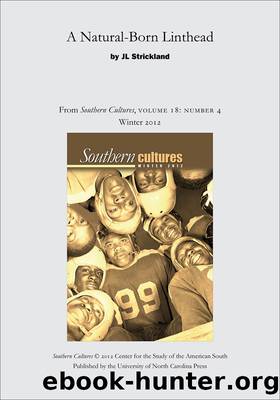A Natural-Born Linthead by JL Strickland

Author:JL Strickland [Strickland, JL]
Language: eng
Format: epub
Tags: History, United States, State & Local, South (AL; AR; FL; GA; KY; LA; MS; NC; SC; TN; VA; WV)
ISBN: 9781469608464
Google: 17-RLWuQV38C
Publisher: UNC Press Books
Published: 2012-11-16T16:05:45+00:00
The City of Valley, Alabama, bought Langdale and Riverdale Mills, the companyâs original two from 1866. Duplex houses on 16th Street, Langdale Mill Village, 1997, courtesy of the collections of the Library of Congress.
The City of Valley, Alabama, bought Langdale and Riverdale Mills, the companyâs original two from 1866. How they will be used is still a source of debate. The other mills are for sale, or being dismantled by salvage crews for their old brick and timbers. Building materials of this strength and quality are hard to find; they are highly desired. On the other hand, there doesnât seem to be much demand for old lintheads. They canât sell off their body parts, legally. The world has pretty much passed them by. Their old jobs are in Pakistan, China, and India, but they have been left behind. Twenty-first century America doesnât have much use for weavers, spinners, and loom fixers. Economists say we must change from manufacturing to a service industry. âService industryââthat must be the new name for repo men, and foreclosure agents.
If I had to describe the spirit and nature of the Valleyâs residents in just one word, that word would be generous. They were, and are, a mixture of saints and sinners, upright stalwarts and broken vessels, like every community. But, their generosity cannot be denied, in neither heart nor deed. They take care of their own, especially so when the mills were still humming. Indeed, when Valley was incorporated into a city, its slogan became, âWhere People Care and Share.â âTwas ever thus.
Back in the day, when I was working third shift, an older blind couple would frequently appear at the gate at quitting time, singing for donations. He was a thick giant of a man, with a shock of white hair on his big head, who wore a rumpled suit. His wife was a small woman, who probably weighed less than ninety pounds. She wore a plain housedress, buttoned up the front. They would take off their dark glasses so passers by could see their unseeing eyes, withered in their sockets. The tiny woman would hold the back of the burly fellowâs coat as he strummed his beat-up guitar as they sang, he with a soft bass voice, she in a high thin soprano that rose in the cool morning air like a slender green vine. She held a large tin can in her free hand.
They would position themselves right in front of the mill gate. The night shift rushing out would part around them, like they were a rock in a flowing river. Cotton mill hands were always in a hurry to leave at shift change, but most always dropped money in the blind womanâs can. As the coins and dollar bills dropped into the can, they would sing: âI saw the light, I saw the light, no more darkness, no more night . . .â In time, the blind couple stopped coming. I never knew what happened to them; actually, never even knew their names.
Download
This site does not store any files on its server. We only index and link to content provided by other sites. Please contact the content providers to delete copyright contents if any and email us, we'll remove relevant links or contents immediately.
| United States |
In Cold Blood by Truman Capote(3374)
The Innovators: How a Group of Hackers, Geniuses, and Geeks Created the Digital Revolution by Walter Isaacson(3132)
Steve Jobs by Walter Isaacson(2888)
All the President's Men by Carl Bernstein & Bob Woodward(2362)
Lonely Planet New York City by Lonely Planet(2210)
And the Band Played On by Randy Shilts(2185)
The Room Where It Happened by John Bolton;(2145)
The Poisoner's Handbook by Deborah Blum(2126)
The Innovators by Walter Isaacson(2096)
The Murder of Marilyn Monroe by Jay Margolis(2091)
Lincoln by David Herbert Donald(1981)
A Colony in a Nation by Chris Hayes(1925)
Being George Washington by Beck Glenn(1889)
Under the Banner of Heaven: A Story of Violent Faith by Jon Krakauer(1788)
Amelia Earhart by Doris L. Rich(1685)
The Unsettlers by Mark Sundeen(1682)
Dirt by Bill Buford(1668)
Birdmen by Lawrence Goldstone(1659)
Zeitoun by Dave Eggers(1641)
